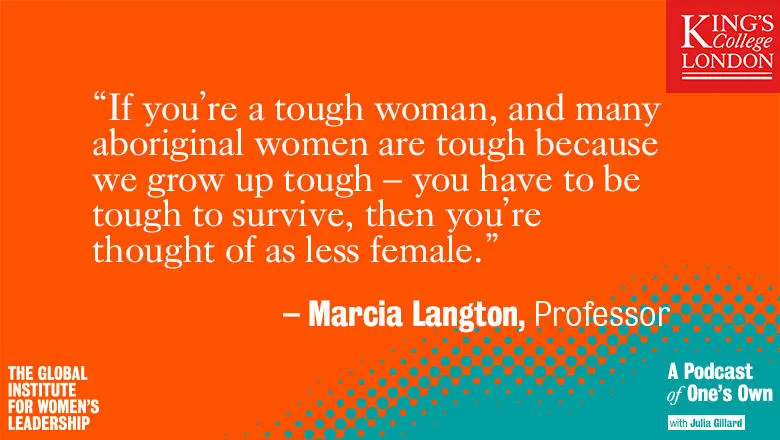21 January 2020
A Podcast of One's Own: Marcia Langton on Aboriginal women's rights
Professor Marcia Langton talks to Julia about a lifetime of campaigning for justice and rights for Aboriginal Australians

In the first episode of series two of A Podcast of One’s Own Julia talks to leading academic and Indigenous activist Marcia Langton. As the Foundation Chair in Australian Indigenous Studies, Distinguished Professor and Associate Provost at the University of Melbourne, Langton has spent her career spotlighting the inequalities faced by Indigenous people in Australia, especially women and girls:
“The life of many Aboriginal and Torres Strait Islander women…is marked by violence and abuse… we have a long way to go before Aboriginal women and girls are treated with respect and feel safe.”
Langton sees herself as a “public intellectual” whose duty is to translate science and social science into popular forms: “so that people understand the actual legacy of having this unique phenomenon of a population that is descended from humans who arrived here over six millennia ago…the longest civilisation in one place, anywhere on the planet.”
A legacy of this civilisation, which survived ice ages and rising sea levels over millennia, is, she says, the “continent-wide land management system” they created to “control the wildfire” and “carve out human society in a highly fire-prone continent”. A particularly pertinent point in light of the bushfires continuing to rage across Australia.
Langton has been a spokesperson and activist on Aboriginal rights throughout her career, amassing a body of knowledge and pushing for justice in the areas of land rights, civil and human rights as well as promoting Indigenous history, culture and art. She was involved in activism from an early age, having grown up in 1950s Queensland under what she terms as a “highly normalised state of segregation” where racism and violence seeped into every part of society, including school: “In my childhood there was no justice.”
To survive the daily abuse, she turned to reading, having taught herself to read before she even started school. Books and solitude opened her mind and her response to the cruelty inflicted by teachers and students was to “think about it…I think I became an intellectual in grade one.”
At the age of 18 and having become a mother, Langton was an activist for Aboriginal rights movements, attending and organising demonstrations. However, she felt forced to leave the country, embarking on a five-year trip around the world, after the police, who raided her house every Saturday morning, threatened her baby.
During her travels she encountered Buddhism on a bus in Taiwan and feminism on a train in Japan. Throughout the experience she says she “met a lot of interesting people and my eyes were opened.”
Langton eventually returned to Australia, becoming the first “self-identified” Indigenous honours graduate in anthropology: “I think many Aboriginal people went through the university system and in order to avoid the racism, did not identify [as Aboriginal].”

Her career, focusing on working to support Indigenous social and cultural issues and land claims, led her eventually into university research and teaching. For Professor Langton, the pace of change has been so slow when it comes to Aboriginal rights and justice, it’s almost beyond her comprehension:
“I just can’t explain why Australians think it’s acceptable to treat Aboriginal people and especially Aboriginal children in the way that we see [with brutality, violence, contempt] it’s blatant, it’s obvious, it’s televised, you can’t deny it…To call it ‘racism’ is a pathetic response to a systemic injustice that ought to be shameful to Australians.”
As a consequence of her lifetime fighting for Indigenous rights, Langton has been the target of extreme daily abuse, whether through social media or letters. She has also been criticised for going against the grain in academia, including the way she dresses, her outspoken manner and her unusual publication titles. But she says she’s not upset by them:
“If you’ve had your life threatened from a young age, what is there to be afraid of? So shoot me.”
The combination of racism and misogyny she has faced on an almost daily basis: “blurs into a kind of nightmare which I park over in the ‘Do not deal with this’ basket’.”
She also feels she’s treated differently as an Aboriginal woman:
“If you’re a tough woman, and many Aboriginal women are tough because we grow up tough, you have to be tough to survive, then you’re thought of as less female…people, perhaps unconsciously…dehumanise me, degenderise me because they can’t disentangle the racism and sexism.”
You can find this and previous episodes of A Podcast of One’s Own, on all the main podcast platforms. If you enjoy this episode and others please rate and review us on your preferred podcast provider, it really helps us reach more listeners with whom we can share our messages promoting a more gender equal world.
